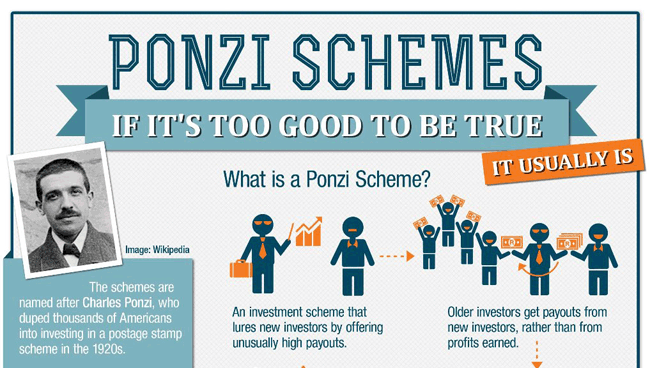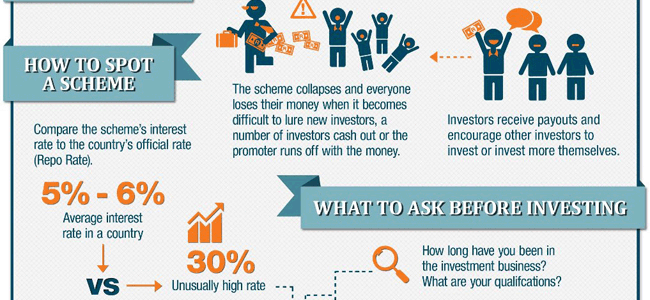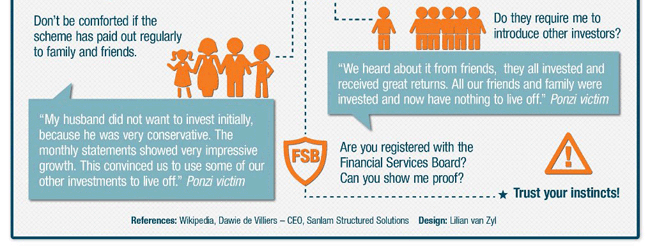
Pyramid Schemes: Easy To Fall For, And Even Early Birds Lose The Worm
“If it sounds too good to be true, it probably is” (wise old adage)
Pyramid schemes are in the news again
Tell everyone - Being an “early bird” doesn’t help
The reality is that even the “early birds” are at serious risk of losing not only their “profits” but also their original investments.
A recent Supreme Court of Appeal (SCA) case illustrates -
How an innocent investor lost R224,000
The bottom line – take advice!
Pyramid schemes are in the news again
They are easy to fall for, with not only desperate pensioners and low-wage earners but also Captains of Industry and many otherwise-savvy investors regularly tricked into “investing” in them. The reason of course is that the con artists behind these schemes are adept at hiding their true nature, coming up like clockwork with ever more creative cover stories to lure the unwary. Very popular are “Ponzi” schemes, where the masterminds behind them promise to do everything for you – all you need do is “invest”, then sit back and reap the profits.
Don’t be a victim!
Workplaces are great hunting grounds for these swindlers, so if you are an employer it is worth warning your staff upfront about how to spot and avoid these schemes. See Sanlam’s Infographic below for some classic warning signs -


 |
||
| Source: Sanlam Employee Benefits. Reproduced with authority from http://thinkvisually.co/portfolio/ponzi-schemes-sanlam/. |
Many pyramid schemes rely on their victims putting aside their suspicions in the perennial hope that, even if the scheme is illegal and doomed to eventual collapse, they will be one of the few (12%) “Early Birds” flying away into the sunset with all the loot whilst the latecomers (88%) are left with all the losses.
The reality is that even the “early birds” are at serious risk of losing not only their “profits” but also their original investments.
The reason is that a liquidator (“trustee” in the case of a person or a trust) can recover any monies paid out by a liquidated scheme during the 6 month period prior to liquidation, unless the recipient can prove that the disposition was made “in the ordinary course of business” and without intention to prefer one creditor above another. Note that the investor isn’t safe even after 6 months, although the onus of proof then shifts to the liquidator.
A recent Supreme Court of Appeal (SCA) case illustrates -
How an innocent investor lost R224,000
- A Trust attracted investors to a pyramid scheme by fraudulently promising that the scheme was “viable, lawful, not in contravention of any statutory or regulatory provisions, not a pyramid scheme and that the deposits would be utilised by the Trust to purchase from certain estate agents their rights to commissions which had been earned but not yet paid”
- When the scheme collapsed the Trust was sequestrated and the original trustees convicted of criminal offences
- The trustees in the insolvency sued an investor for return of “undue preferences” totalling R224,000 being –
- A first investment of R100,000 repaid after 3 months with interest of R12,000 (effectively a 42% rate of interest), and
- A second investment of R100,000 repaid after 2 months with interest of R12,000 (effectively a 74% rate of interest)
- A first investment of R100,000 repaid after 3 months with interest of R12,000 (effectively a 42% rate of interest), and
- As the investor had been paid out less than 6 months before sequestration, the onus was on him to prove his defence that the payments were made “in the ordinary course of business”
- Unsurprisingly however the SCA held that the payments were clearly – on a factual, objective basis - not made in the ordinary course of business. No matter that the investor acted innocently (it was accepted that he had no knowledge of the true nature and illegality of the scheme), he must repay to the sequestrated Trust both the R24k interest and his original R200k capital, together with interest and legal costs. Of course he still has a concurrent claim against the sequestrated trust, but statistically that’s likely to be worth little or nothing.
The bottom line – take advice!
Take advice before you invest in anything offering suspiciously high returns. If you decide to go ahead anyway, make sure that you can afford the risk of losing it all - because you probably will.
And if after you invest you start picking up inklings of anything irregular or illegal, get legal assistance immediately. Some of the Court’s comments suggest that the investor’s claim would have been a lot stronger had he become aware of the true nature of the scheme and then demanded repayment of his capital, not on the basis that the investments were due for repayment but on the basis that they were illegal and void – an important distinction that might have saved him R200,000.
Provided by Wessels + van Zyl Inc
© DotNews. All Rights Reserved.
